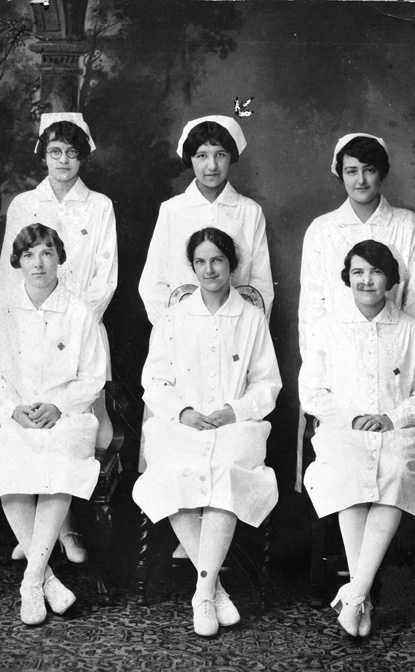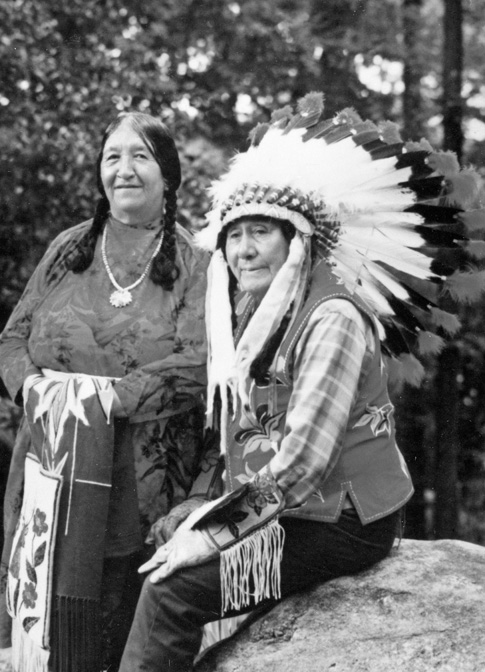
Susie Walking Bear Yellowtail was among the first Apsáalooke (Crow) people to achieve a higher education. Like many Native children of her generation, she attended mission boarding schools where students were expected to give up their indigenous languages, beliefs, and cultural ways. Instead, Yellowtail maintained her Apsáalooke identity and, guided by her cultural heritage, used her education to improve the lives of American Indian people.
Born in 1903 and orphaned as a child, Susie grew up in Pryor and attended a boarding school on the Crow Reservation. As the only child who spoke English, Susie translated for the other students. With her missionary foster parents, Susie soon left the reservation for Oklahoma, where she briefly attended a Baptist school. Her guardian, Mrs. C. A. Field, then sent Susie to Northfield Seminary in Massachusetts. Mrs. Field paid Susie’s tuition, but Susie earned her room and board by working as a housemaid and babysitter.
After graduation, Susie continued her education by enrolling at Boston City Hospital’s School of Nursing. She graduated with honors in 1923 and finished her training at Franklin County Public Hospital in Greenfield, Massachusetts. In 1927, Susie Walking Bear became the first registered nurse of Crow descent and one of the first degreed registered nurses of American Indian ancestry in the United States.
After working with other tribes for a few years, she returned to the Crow Reservation and married Thomas Yellowtail, a fellow Crow who also continued to practice Apsáalooke spiritual and cultural traditions. Susie Yellowtail worked first at the government-run hospital at Crow Agency and then traveled to other reservations as a consultant for the Public Health Service. Wherever she went, she observed similar problems: the appalling living conditions and unmet health-care needs on the reservations, the need for cultural competency among medical professionals working with indigenous people, and the need for immediate reforms in the Indian Health Service.
Yellowtail documented instances of Indian children dying from lack of access to medical care, Indian women being sterilized without consent, and tribal elders unable to communicate their health concerns to doctors. She also pushed for effective improvements to the Indian Health Service, such as allowing traditional tribal healers to attend Indian patients and creating the Community Health Representatives outreach program on reservations. In the words of her daughter, Connie, “She became a watchdog on health care for Indians.”

Throughout her career, Yellowtail served on Indian health and education councils at the tribal, state, and federal levels, including as an appointee to the President’s Council on Indian Education and Nutrition and the U.S. Department of Health, Education and Welfare’s Council on Indian Health under three different administrations. In each of these positions she advocated improved health care, better access to care, and better living conditions for American Indians. “When she talked, people—both Indian and Non-Indian—listened. Why? Because this woman spoke with experience, knowledge and conviction about the poor health conditions of the Indians and how to make the Indian healthy and strong once again. She also had great concern for the education of her people,” said her friend, tribal historian Joe Medicine Crow.
Yellowtail knew that education could help Indians improve their situation, not by taking something essential from them, but by giving them a chance to apply their cultural values in ways that built up their communities. While she advocated for formal education, she also promoted Crow culture through involvement in events such as the annual All-American Indian Days and by serving as chaperone for the Miss Indian America contestants. Susie and Thomas Yellowtail were among the federal government’s American Indian goodwill ambassadors to several foreign nations in the 1950s, cheerfully sharing their cultural heritage and Susie’s fine beadwork with people around the world.
At home, Yellowtail exemplified Apsáalooke maternal commitment to the well-being of children. She raised three of her own and several other youngsters and took in other people in need. Joe Medicine Crow observed that Yellowtail became increasingly concerned with child welfare: “She realized that the modern Crow family is no longer strong and stable, and that young parents often neglected, abused and even abandoned their children. She wanted to establish a children’s home and orphanage on the Crow Reservation.” Although she did not live to accomplish this goal, her adherence to Crow values, her pride in her Crow identity, and her devotion to her community serve as models for present and future generations.
Deservedly, Susie Walking Bear Yellowtail received the President’s Award for Outstanding Nursing Health Care and is included among the honorees in the Gallery of Outstanding Montanans in the Capitol Rotunda in Helena. Among the Crow, she will forever remain “our bright morning star.” LKF
Sources
“Big Heart.” American Society of Registered Nurses, http://www.asrn.org/journal-chronicle-nursing/205-big-heart.html. Accessed October 6, 2013.
Jackson, Connie Yellowtail. “Susie Walking Bear Yellowtail.” Copy of unpublished manuscript in Susie Yellowtail, Vertical File, Montana Historical Society, Helena (hereafter MHS).
Medicine Crow, Joe. “Susie Yellowtail, 1903-1981.” Copy of undated tribute, ca. 1981, in Susie Yellowtail, Vertical File, MHS.
Scozzari, Trish Erbe. “The Journey of America’s First Native Nurse.” Yellowstone Valley Woman, 2009, http://yellowstonevalleywoman.com/view_article?id=202. Accessed October 6, 2013.
Walters, Dave. “Susie Yellowtail (1903-1981).” Manuscript used for the induction of Susie Yellowtail into the Gallery of Outstanding Montanans in Susie Yellowtail, Vertical File, MHS.